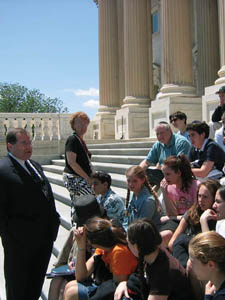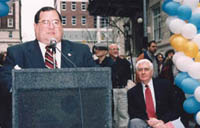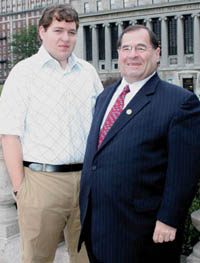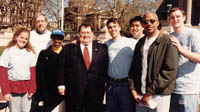|
|
 |
 |
|
FEATURESLiberal ... and Proud of ItJerry Nadler ’69 has not wavered from his convictions while representing New Yorkers for three decades.By Daniel Fastenberg ’06

On the steps of the Capitol in 2003, Nadler speaks to a group of eighth graders from the Ramaz school in New York City. 
Jerry Nadler ’69, longtime Democratic congressman from New York City, speaks his mind — even if it means stepping on some toes. Last June, when the House of Representatives was debating the flag-burning amendment, proponents tried to turn the issue into a question of patriotism. As one of the amendment’s chief critics, Nadler bristled and declared, “If the flag needs protection at all, it needs protection from members of Congress who value the symbol more than the freedoms that the flag represents.” The candid congressman serves a diverse constituency. Nadler’s oddly gerrymandered Eighth Congressional District includes the southern half of Manhattan’s West Side, all of downtown Manhattan and a section of southern Brooklyn that includes Borough Park, Bay Ridge, Bensonhurst and Coney Island. “I think the world of Congressman Nadler,” says Ruggles Professor of Political Science and History Ira Katznelson ’66. “He’s smart, persistent and committed to progressive values. For this reason, I was particularly proud when my son, Zachary, worked on his staff for two years after his graduation from Brown.” While public officials rarely speak without rehearsed talking points passed on from party bosses, Nadler speaks freely, rarely stumbling over a word and avoiding oversimplification. It’s little wonder that he is a regular on the Beltway’s talking head circuit, including frequent appearances on Crossfire, Larry King Live and Meet the Press. Nadler’s arrival in Congress in 1993 could not have appeared more auspicious. For the first time since the Carter administration, the Democratic Party seemed to have a stronghold on the country, running the legislature and the White House. But the moment eclipsed nearly as quickly as it began. The failure of President Bill Clinton’s healthcare initiative gave way to Newt Gingrich’s 1994 “Contract With America,” with Republicans controlling Nadler’s new workplace. Nadler’s uncompromising pragmatic progressivism has led him to find his niche on the margins of his country’s government, and even within his party. Time and again, Nadler has fought for privacy, due process, civil rights, abortion rights and the rights of sexual minorities. 

Nadler spoke at the April 2000 opening of the Kraft Family Center for Jewish Student Life. Photo: Joe Pineiro 
“He’s clearly one of the stars in the New York delegation,” says Doug Muzzio, professor of public affairs at Baruch College and a New York City political analyst for WABC-TV. “He’s not going to lose anytime soon, so he has a lifetime congressional job should he want it.” Nadler again was in the minority when it came to the Patriot Act, which held a special significance for him because his district includes the World Trade Center site and he has senior standing on the House Judiciary Committee. Following the post–9-11 groundswell of support for President George W. Bush, a mere 66 representatives, including Nadler, and only one senator voted against the Patriot Act. “You had to bear in mind that the passion of the moment would pass,” Nadler says from his office in the Vesey Street Federal Building, reflecting on his vote four years later. “Whenever you do something, you have to think about how you are going to look back at it five years from then, not just five minutes.” Nadler credits his resistance to his desire to protect civil liberties. “In most of our wars, we have done things in the name of national security that trampled civil liberties,” he notes. “Invariably, 20 years later, the story says the measures didn’t help national security, and we almost always end up apologizing for what we did 30 years later. We should learn from that.” To back up his point, Nadler cites historical examples with professorial authority, including the 1798 Alien and Sedition Acts, the suspension of the writ of habeas corpus in the Civil War, the Espionage Act of 1917 and the Japanese internment camps during World War II. The Senate saw fit to apologize to the prisoners of these camps in 1988. Nadler’s defense of civil liberties is no anomaly; in fact, the issue was the prime motivation for his entrance into politics. “I used to read newspapers, when I was 9, 10, 11 years old, and get very angry about Supreme Court decisions,” Nadler recalls. “In the pre-Warren court, you’d read a decision about some poor guy who would have the crap beat out of him to confess to some heinous crime, and the Supreme Court would ‘OK’ the decision 7–2, [Hugo] Black and [William O.] Douglas dissenting.” 

Nadler on campus with his son, Michael ’07. Photo: Jesse Coffino-Greenberg ’04 
Nadler’s activism was evident from an early age. Born in Brooklyn in 1947, he was the son of a struggling poultry farmer. After spending his earliest years on the farm in New Jersey, Nadler moved back to Brooklyn to attend Crown Heights Yeshiva. He attended Stuyvesant High School, where his varied interests were infused with politics. “I spent four years in high school learning how to try to combine politics, astrophysics and molecular biology. I’ve never figured it out,” Nadler says with a chuckle as he points to the stack of Scientific American magazines on his desk. While at Stuyvesant, Nadler got his first taste of political success, running for president of his senior class in a remarkably successful campaign managed by Dick Morris ’67, who later engineered President Clinton’s 1996 reelection. Dick Gottfried ’73L wrote and distributed Nadler’s campaign literature; he now is New York’s 64th District assemblyman. “If you knew Jerry Nadler when he was 14, nothing about him today would be a surprise,” Gottfried says of his friend of 44 years. “Almost everything you would say about Jerry today, you would say when he was a teenager.” The fire of participatory activism within Nadler figured prominently in his decision to attend the College in 1965. “I chose to go to Columbia in order to be involved with New York politics immediately, instead of waiting until after college,” he says. “My experience at Columbia is the foundation of my political career.” That experience was so infused with politics that there was little room for anything else. Of his undergraduate days, Nadler says, “I spent much too much time on politics, too little time as a student and too little time getting to know my fellow students who weren’t involved in politics off campus. It’s something I regret.” He happily adds that his and his wife Joyce Miller’s son, Michael Nadler ’07, is “doing it the right way.” As soon as Nadler enrolled, he committed himself to issues that reached beyond campus. One that figured most prominently at the time was the growing conflict in Vietnam. Nadler was a founder of West Side Kids, which focused on reforming New York City Democratic politics through support of liberal and anti-Vietnam candidates. The group grew to a membership of roughly 400, composed primarily of students from Hunter and Stuyvesant High Schools as well as from Columbia and NYU. Nadler’s activism propelled him to join Eugene McCarthy’s anti-war candidacy for the presidency in 1968. Nadler was busy canvassing for McCarthy in the lead-up to the New Hampshire primary when Columbia’s 1968 demonstrations began. After a week of protests in April, the police were called to campus to restore order. A boycott of classes ensued and a strike committee was formed. Nadler, who shied away from radical factions, found himself aligned with the “right wing of the strike committee,” which sought to negotiate. The split in the strike committee centered on a disagreement about the policy toward those who crossed the picket lines. “SDS [Students for a Democratic Society] said, ‘physical tactics by whatever means necessary,’ ” Nadler recalls. “We said to them, ‘What, are you crazy? Have you forgotten we are striking, among other reasons, against the use of coercive tactics — and we are going to use coercive tactics? Haven’t you ever heard of civil liberties?’ ” As the 1967–68 school year ended prematurely, Nadler returned to the McCarthy campaign. After McCarthy lost the Democratic Presidential nomination to Minnesota Senator Hubert Humphrey, Nadler founded and chaired the West Side Peace Committee to mobilize New York peace activists. The coalition’s membership grew from 30,000 to 40,000 and spanned a political spectrum from young liberal republicans to neo-Trostkyites. It first came together for a candlelight march on Broadway in October 1969, then headed to Washington, D.C., to continue the protest. Nadler still is connected to the College and consistently makes himself available to students. Recently, he visited Morningside Heights to address a new student group, Pro-Israel Progressives. He also has participated in Columbia Community Service and takes part in Columbia’s Capitol Hill internship program by meeting with students during their summer stay in Washington, D.C. After graduation, Nadler quickly became involved in public service. His eventual rise to Congress was preceded by a 16-year tour of duty in the New York State Assembly, which began with his election in 1976 to represent the 67th district. Nadler began his legislative career while still finishing his education — he graduated from Fordham Law in 1978 after enrolling in its night program. In Albany, Nadler began to tackle the same issues — social justice, inner-city housing and transportation — that he eventually would take on in Washington, D.C. As an assemblyman, he achieved a considerable amount of publicity for his role in negotiating commercial rent regulations and improving rail-freight capacity. “His effectiveness comes from him doing his homework, and that’s distinct,” says Ester Fuchs, a professor of public policy at SIPA and in the political science department who recently returned to Columbia after serving as special adviser for governance and strategic planning in Mayor Michael Bloomberg’s office. 

Nadler was a guest speaker at Columbia Community Outreach in 1999. Photo: Joe Pineiro 
After losing a 1985 bid for Manhattan borough president and having an unsuccessful 1989 run at the New York City comptroller’s office, Nadler’s next political breakthrough came on the heels of a tragedy. Ted Weiss, at 64, seemed well on his way to his ninth consecutive victory as the U.S. representative for New York’s Eighth Congressional District until he unexpectedly died on September 14, 1992. That night was the eve of a primary election against a fringe candidate who was not expected to give Weiss, one of the most liberal members of Congress, much of a challenge. And he didn’t — voters gave Weiss, though deceased, one last victory, allowing Democratic Party leaders to choose his replacement. Nadler was named by The New York Times as one of seven potential successors who expressed interest in the position. Just nine days after Weiss’s death, Nadler emerged from the Democratic County Committee meeting of 1,000 delegates as its anointed candidate. The overwhelming support was credited to Nadler’s career-long outreach to party members. Nadler won the seat with roughly 80 percent of the vote, a level he has maintained biennially. Early prominence came from his constitutional defense of President Clinton during the 1998 impeachment hearings. The procedural process of impeachment starts in the House Judiciary committee, which has the power to draw up the articles of impeachment. Although just a third-term congressman and a junior member of the committee, Nadler was a leader of the rhetorical charge defending the Clinton in committee. “We need to remember that the framers of the Constitution did not intend impeachment as a punishment for wrongdoing, but as a protection of constitutional liberties and of the structure of the government they were establishing against the President, who might seek to become a tyrant,” Nadler said during the hearings. Indeed, Nadler achieved a level of celebrity status for his defense of the President, calling the incident a “partisan coup d’etat,” a phrase that gained popular appeal. Nadler’s continued activism on the Judiciary Committee is supplemented by his involvement with transportation issues. As co-chair of the Transit Caucus, he forced Congress to focus on improving subway service and has worked to bring New York a greater share of federal mass transit funding. Nadler still calls for a change to downstate New York’s dependence on the George Washington Bridge for freight transit, calling it a national security problem. “When Jerry has his mind around something, he is really dogged,” says Barbara Fife, director of external affairs at Baruch College’s School of Public Affairs and former deputy mayor of New York under David Dinkins. “I think his agenda is broader than the classically localized glamour issues of the day. He is convinced about his issues, and the fact that traffic is choking the city means that Jerry won’t ignore the problem. He is sticking with it, and you have to respect someone with that kind of conviction.” As a result of Nadler’s insistence, support for a Cross Harbor Tunnel project is gaining momentum and now has the backing of local, state and federal leaders and transportation experts. Because of his expertise, Nadler is a senior member of the House Transportation and Infrastructure Committee. 
“I’ve never felt jaded by the political process because I don’t think that I was that starry-eyed to start with.” 
The significant number of Jewish people in Nadler’s district, as well as his Orthodox Jewish upbringing, has made Israel a central issue for him throughout his legislative career. Nadler has been a vociferous supporter of the Middle East peace process, and his background has informed his political philosophy, leading him to quote Talmudic passages, in Hebrew, that support his views on the death penalty. While Nadler has called for a moratorium on the death penalty, he refuses to get mixed up in partisan bellyaching. Rather, he opts for policy-oriented critiques of the opposition. Asked to share his thoughts about the current administration, Nadler’s first reaction is to discuss an issue that has frustrated many across the political spectrum. “You can’t start a war the way they did and continue cutting taxes,” Nadler says about the federal budget. “The policies are irresponsible, and the effects on the deficit will be long-term.” While Nadler voted against giving the President authority to invade Iraq, he is weary of the call for an immediate pullout being sounded by many on the left. “There was no threat to us. It was ridiculous to get involved,” Nadler says. “Having said that, it’s not so easy to walk out … We started it, we can’t just say, ‘To hell with it all.’ Something is at stake here, we have created a real mess and we have created a major problem by radicalizing a lot of people in the Muslim world.” Des pite the limited progress of the liberal agenda since President Bush has been in the White House, Nadler shows no signs of backing down. “I’ve never felt jaded by the political process because I don’t think that I was that starry-eyed to start with,” Nadler says. “In other words, I knew politics is the art of the possible. I knew that people are not necessarily rational. I knew that politics can be very frustrating, but I also knew that it’s the only way to accomplish anything other than warfare. And it’s a lot better than warfare. How do you reconcile difference? Do you do it with a ballot or a club?” In 1999, Vanity Fair inducted Nadler into its Hall of Fame, saying “he’s liberalism the way it oughta be.” Hearing himself described in such a manner, Nadler says without hesitation, “My mother would be proud.” Daniel Fastenberg ’06 received his B.A. in history in February.
|
|
||||||||||||||||||||||||||||